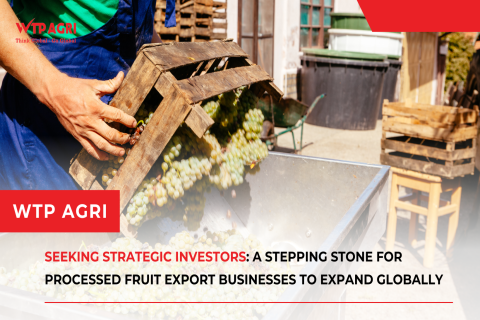Seeking Strategic Investors: A Stepping Stone for Processed Fruit Export Businesses to Expand Globally
In the increasingly competitive landscape of the processed fruit export market, finding a strategic investor is crucial. A strategic investor not only provides essential capital but also offers other valuable resources such as networks, management experience, and technology. These elements can help a business scale production, enhance product quality, and penetrate deeper into international markets. This article shares insights and practical tips for processed fruit export businesses to create an attractive profile, search for, and attract potential strategic investors.
I. Why is a Strategic Investor Necessary?

Access to Large Capital: Strategic investors often commit significant funds to promising projects, enabling businesses to expand production, build factories, cold storage, and invest in processing technology.
Market Expansion: Strategic investors typically have extensive industry networks, helping businesses access new markets, particularly challenging ones like Europe and the U.S.
Enhanced Management Capabilities: Strategic investors are often industry experts who bring valuable management knowledge and experience, helping businesses improve operational efficiency.
Improved Brand Image: Having a well-known strategic investor can boost the company’s credibility and brand image, fostering trust among customers and partners.
II. Building an Attractive Company Profile
A company profile serves as the "face" of the business, determining whether an investor will take a closer look. An attractive company profile should include:
Company Overview: A brief introduction to the company’s history, scale, operations, target markets, and vision.
Products/Services: Detailed descriptions of current products/services, highlighting unique features and competitive advantages.
Market and Customers: In-depth analysis of target markets, potential customer segments, consumption trends, and business opportunities.
Business Plan: A clear presentation of the business’s future plans, including specific objectives, development strategies, and revenue and profit forecasts.
Management Team: An introduction to the experienced and capable management team.
Achievements: A showcase of the company’s achievements, awards, and certifications.
Capital Requirements: A clear statement of the amount of capital needed, its intended use, and the repayment plan.
III. Finding Strategic Investors

There are several ways to find strategic investors, including:
Participating in Trade Fairs and Industry Exhibitions: These events offer opportunities to meet investors directly, showcase products, and seek potential partners.
Connecting with Investment Funds: Funds specializing in agriculture and food sectors often seek potential investment projects.
Attending Networking Events: Workshops, conferences, and networking events are excellent venues to meet investors and industry experts.
Utilizing Online Platforms: Platforms like LinkedIn, AngelList, and Crunchbase allow businesses to connect with investors globally.
IV. Attracting Investors
To attract investors, businesses should:
Build Strong Relationships: Actively communicate and build trust with investors.
Clearly Communicate the Company’s Value: Help investors understand the value the business offers, growth potential, and attractive investment opportunities.
Demonstrate Profitability: Present a viable business plan showing the company’s ability to generate high returns for investors.
Ensure Transparency: Provide complete information about the company, its finances, and operations.
V. Key Aspects to Consider When Negotiating with Investors
1. Negotiating with Investors: Striking a Balance of Interests
After establishing a strong relationship and attracting investor interest, the next critical step is negotiation. This stage requires careful preparation and flexibility to reach an agreement beneficial to both parties.
Contract Terms:
- Share Distribution: Clearly define the ownership ratio after receiving the investment.
- Voting Rights: Determine the investor's role in decision-making processes.
- Economic Benefits: Outline profit-sharing and dividend distribution mechanisms.
- Exit Clauses: Specify terms for share buyback, IPO, or company sale.
- Management and Operations: Define the investor’s role in company management.
- Performance Evaluation: Agree on performance metrics and assessment methods.
- Special Scenarios: Address potential market changes, competition, or crises.
2. Developing an Exit Strategy
An exit strategy is a crucial part of the negotiation process. Both the business and the investor need a clear plan for exiting the investment in the future.
Forms of Exit:
- IPO: Listing the company on the stock exchange.
- Company Sale: Selling all or part of the company to another party.
- Buyout: Investors or other shareholders repurchase existing shares.
- Exit Timing: Determine the appropriate timing for exiting, based on company growth and market conditions.
3. Risks and Challenges

Partnering with a strategic investor comes with certain risks and challenges:
Loss of Control: The business may lose some control over the company.
Growth Pressure: Investors often set high growth targets, creating pressure on the business.
Conflict of Interest: Potential conflicts of interest between the business and investors.
Market Risks: Economic, political, and social factors may impact the business's operations.
4. Common Investor Questions
To prepare well for negotiations, businesses should anticipate potential investor questions, such as:
- What makes the company’s business model unique?
- What is the target market?
- What experience does the management team have?
- Who are the main competitors?
- What is the financial plan for the next five years?
VI. Conclusion
Seeking a strategic investor is a complex process that offers numerous benefits for businesses. By preparing thoroughly, building strong investor relationships, and negotiating wisely, companies can secure the necessary capital to grow and expand. Moreover, by preparing an attractive company profile, an effective outreach strategy, and a professional management team, businesses can increase their chances of attracting potential investors, thereby opening up new development opportunities.
News Related
- Dried Fruits Import: Attractive Business Opportunity for International Businesses
- 5 delicious and refreshing nata de coco drink recipes
- A step forward in bilateral cooperation between Vietnam - the United States
- Advantages of shifting the fruit juice supply chain to Vietnam
- Bringing dried fruit products into the United States

 Vietnamese
Vietnamese  Korean
Korean Japanese
Japanese Chinese
Chinese



